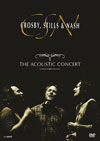CROSBY, STILLS & NASH : THE ACOUSTIC CONCERT
- Déjà Vu
- Helplessly Hoping
- Just a Song before i go
- Guinnevere
- Marrakesh Express
- Long Time Gone
- To the Last Whale : Critical mass / Wind on the water
- Try to Find Me
- 1,000 Roads
- for what it's worth
- Taken at All
- Wooden Ships
- Suite: Judy Blue Eyes
- our house
- daylight again / Find the Cost of Freedom
- teach your children
Label : Rhino
Release Year : 2004
Running Time : 86 minutes
Recording Date : November 10, 1991
Venue : The Warfield Theater, San Francisco, California, USA
NTSC : 4:3
Review (AllMusic) : Crosby, Stills & Nash's The Acoustic Concert is mastered with a loud and full sound. Videotaped at a 1991 show in San Francisco that was done as a memorial to the group's friend, Bill Graham, there is more here than meets the eye - indeed, what initially meets the eye is most unpromising, the decidedly overweight presence of David Crosby and Stephen Stills (evidently Graham Nash's metabolism won't let him gain weight). But as it turns out the group vocal prowess is still very much intact, because they harmonize magnificently (far better, in fact, than they generally did at Woodstock), and despite its being credited as The Acoustic Concert, that doesn't stop Stills from picking up an electric guitar to add a little appropriate wattage to "Deja Vu," "Just a Song Before I Go," and more. Graham Nash, whose guitar was seldom ever even plugged in when he was in the Hollies, gets to play a little acoustic guitar on "Marrakesh Express," in the midst of a superb lead vocal performance. "To the Last Whale" is presented visually as more of a conceptual video than anything else here, in its opening, before the camera returns to the stage for the song's second half (featuring Nash on grand piano). Neil Young, though absent, gets a song dedicated to him in "Try to Find Me." When Stills takes center stage for his spot, he delivers a loud, crunchy rendition of "For What It's Worth" that's more a deconstruction of the song than a performance - much more successful are the resurrections of "Suite: Judy Blue Eyes" (to which he tacks on an extended acoustic guitar coda that incorporates elements of "Carry On," and a high-speed solo in which he sounds like he's playing 16th notes) and other early songs by the trio. The cameras are constantly in motion and the editing keeps the eye moving and occupied, and the show was more than good enough to occupy the ear as well, especially with the audio quality as good as it is here.
